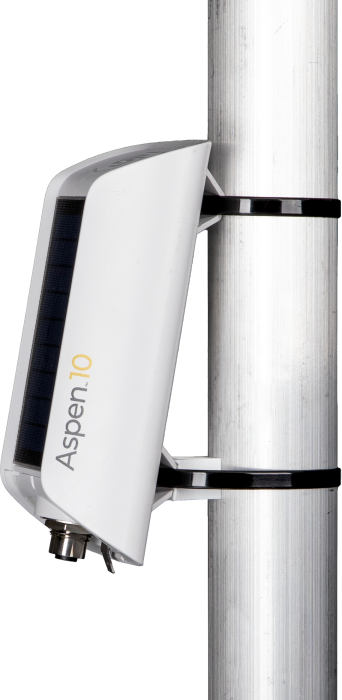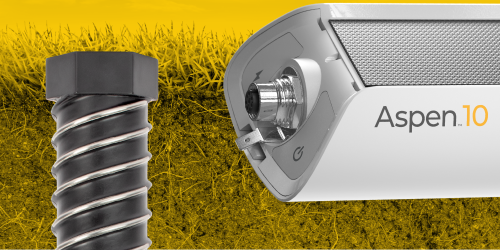Overview
The revolutionary Aspen™10 Internet of Things (IoT) Edge Device allows users to easily connect their environmental sensor to the cloud. It is rugged and durable and may be mounted outdoors without the need for a second enclosure. It has an integrated solar panel and internal rechargeable battery, making the Aspen 10 a truly self-sustaining device.
The Aspen 10 is also small and compact, which makes it easy to install in a variety of locations without disturbing the environment it is monitoring. An integrated IoT cellular modem allows the Aspen 10 to transmit data to the cloud, and a global positioning system (GPS) receiver provides automated installation location.
Setting up the Aspen 10 to read your sensor is quick and easy thanks to a new sensor interface technology that allows automatic identification of any sensor with an SDI-12 identification. The Aspen 10 publishes this ID to the cloud, in return receiving a customized measurement configuration and program for your specific sensor and application. You can then monitor your data from anywhere.
Read MoreBenefits and Features
- IoT device using local cellular networks as the low-power wide-area network (LPWAN)
- Cellular CAT M1 for worldwide roaming
- Geolocation to automatically determine the edge device's location
- Solar charging to keep the IoT device operational indefinitely using just a few hours of daily sunlight
- Internal rechargeable LiFePO4 battery with reserve power for more than one month's operation without charge for all supported sensors
- Smart sensor detection and identification
- Smart sensor power automatic optimization for the attached sensor
- Simple zip tie system for mounting to almost anything
- Water-resistant enclosure for installation in most environments
- On/off switch for simple operation
- Status LED for operation without a smartphone
- Near field communication (NFC)/Bluetooth for operation with a smartphone to allow on-site analysis through the CampbellGo App
- Optimal security using Message Queuing Telemetry Transport (MQTT) with Transport Layer Security (TLS) mutual authentication
Images








Detailed Description
The Aspen 10 is a multipurpose, compact, entry-level edge device with a simple plug-and-play interface. Supported sensors measure hydrological, meteorological, environmental, and industrial phenomena. The Aspen 10 is part of the IoT and makes sensor data accessible anywhere via the Aspen 10's compatibility with the MQTT protocol and its integration with CampbellCloud. The Aspen 10 provides maintenance-free sensor power and automates cellular connectivity, data storage, and data forwarding to CampbellCloud, where users can both visualize their data and manage API access.
The Aspen 10 is similar to a full Campbell Scientific system and comprises a data logger, wiring terminals, enclosure, solar panel, charge regulator, battery, modem, and antenna—all in one small package.
Compatible sensors are cabled using an eight-pin M12 connector. A detect pin lets the Aspen 10 know that it has connected to a sensor with an SDI-12 capability of self-identification. After identifying the sensor, the Aspen 10 connects to CampbellCloud to retrieve the appropriate configuration and program for that sensor, which enable the edge device to power the sensor appropriately and make accurate analog or digital measurements.
A free app, CampbellGo, enables secure NFC/Bluetooth pairing between a phone and the Aspen 10. This greatly simplifies the installation process with real-time sensor readings, diagnostic tools, and data-to-cloud delivery information while you are on-site. This gives you confidence that everything is working from end to end before leaving the installation site.
All of this allows you to collect data from the selected sensor in the location you need from practically anywhere on the globe.
Aspen 10-Compatible IoT Solutions
The Aspen™10 Internet of Things (IoT) Edge Device can be paired with many of our digital sensors. Click on any of the images below to learn more about our growing list of compatible sensors:
ClimaVue™50 G2 + Aspen 10
Get next-gen IoT solutions for advanced meteorological monitoring.
HygroVue™10 + Aspen 10
Acquire accurate humidity and air temperature monitoring with next-gen IoT solutions.
RainVue™10 + Aspen 10
Access economical solutions for rainfall monitoring.
RainVue™20 + Aspen 10
Experience solutions tailored for high-intensity, smart rainfall applications.
RangeVue™ Series + Aspen 10
Streamline your non-contact water-level monitoring with IoT solutions.
SnowVue™10 + Aspen 10
Discover next-gen solutions for precision snow-depth monitoring.
SoilVue™10 + Aspen 10
Use advanced yet easy solutions for soil profile monitoring.
TempVue™20 + Aspen 10
Employ solutions for air temperature measurements that surpass World Meteorological Organization (WMO) recommendations.
Wintersense SDI-12 + Aspen 10
Benefit from precision IoT solutions for road monitoring and route-based winter maintenance decisions.
Compatibility
Please note: The following shows notable compatibility information. It is not a comprehensive list of all compatible products.
Software
| Compatible | Note | |
|---|---|---|
| LoggerNet | ||
| LoggerNet Admin | ||
| LoggerNet Remote | ||
| PC400 |
Miscellaneous
| Compatible | Note | |
|---|---|---|
| BaroVUE10 | AQ sensor pigtail cable required | |
| ClimaVUE50 (retired) | AQ conversion cable required | |
| ClimaVue 50 G2 | AQ conversion cable required | |
| CS451 | A151 termination box required | |
| CS456 | A151 termination box required | |
| HygroVUE10 | AQ conversion cable required | |
| RainVUE10 | AQ conversion cable required | |
| RainVUE20 | AQ conversion cable required | |
| RangeVue 15 | ||
| RangeVue 30 | ||
| SoilVUE10 | AQ conversion cable required | |
| TempVue 20 | No additional cable required | |
| Wintersense SDI-12 | No additional cable required |
Additional Compatibility Information
The Aspen 10 is only compatible with CampbellCloud. It is not compatible with LoggerNet or any of its derivatives. To access CampbellCloud, please visit our CampbellCloud hosted site.
This edge device is compatible with sensors that support SDI-12 communications, respond to the identify command, and are wired using an M12 eight-pin connector code A as specified by Campbell Scientific.
Please note that the Aspen 10 will not power sensors with heaters, and it does not allow high-frequency data collection.
Specifications
| Processor | 32-bit arm cortex (CPU) |
| Memory |
|
| Program Execution Period | 1 s to 1 day; 1 s increments |
| Real-Time Clock Resolution | ±1 s |
| Real-Time Clock Accuracy | Synchronized with CampbellCloud once per day |
| Operating Temperature Range |
|
| Maximum Scan Rate | 1 s |
| Communications Protocols | SDI-12, HTTP(S), MQTT |
| Case Material |
|
| Digital I/O | Terminals are configured for SDI-12. |
| Certifications | CB Certificate Number NO127343 |
| Dimensions | 16.2 x 8.0 x 5.8 cm (6.4 x 3.2 x 2.3 in.) |
| Weight |
|
Power |
|
| Battery | Note: Charge and discharge characteristics are controlled internally according to battery type. |
|
Battery for -20° to +60°C (-ST) Option |
3.2 Vdc, 7.2 Ah, Li-Po PHD26650 |
|
Battery for -40° to +75°C (-XT) Option |
3.65 Vdc, 5.6 Ah, Li-ion Saft MP176065 xtd |
| Average Current Drain |
|
Power Output |
|
| -NOTE- | Regulated 5, 8, or 12 Vdc (disabled when battery capacity <0.5 Ah) |
| 5 Vdc Current Limit |
|
| 8 Vdc Current Limit | 210 mA |
| 12 Vdc Current Limit | 210 mA |
Communications |
|
| Protocols | SDI-12 |
| Internet Protocols | HTTP(S), MQTT |
| Near Field Communication (NFC) | Target device compatible with CampbellGo |
| Bluetooth Low Energy (BLE) |
|
| SDI-12 | One SDI-12 compliant terminal meets SDI-12 Standard v 1.4. |



































